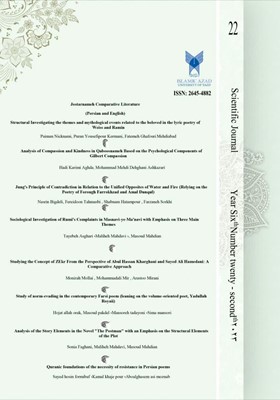Jung's Principle of Contradiction in Relation to the Unified Opposites of Water and Fire (Relying on the Poetry of Forough Farrokhzad and Amal Dunqul)
Subject Areas : Comparative Literature Studies
Nasrin Bigdeli
1
![]() ,
Fereydoon Tahmasbi
2
*
,
Shabnam Hatampour
3
,
Fereydoon Tahmasbi
2
*
,
Shabnam Hatampour
3
![]() ,
Farzaneh Sorkhi
4
,
Farzaneh Sorkhi
4
![]()
1 - Department of Persian Language and Literature, Shushtar Branch, Islamic Azad University, Shushtar, Iran.
2 - Department of Persian language and literature/ Shoushtar Branch/ Islamic Azad University/ Shoushtar/ Iran.
(corresponding author)
3 - Assistant Professor, Department of Persian language and literature, Shoushtar Branch, Islamic Azad University, Shoushtar, Iran
4 - Department of Persian Language and Literature, Shushtar Branch, Islamic Azad University, Shushtar, Iran.
Keywords: Water, Fire, Forough Farrokhzad, Jung’s Principle of Contradiction, Amal Dunqul,
Abstract :
The principle of contradiction is one of the most important factors in the development and flourishing of personality in the collective unconscious part of the human mind, which in Jung's school of analytical psychology is the motivator of all behavior and the producer of all mental energy. By making scientific comparisons between mental energy and sustained biological force, Jung establishes a deep connection between the intensity of the mental energy of myths and their conceptual nature, so that their conceptual place in the deep layers of literary and artistic works is well illustrated. In this study, considering the mental energy and inner force of myths, the works of creators such as Forough Farrokhzad and Amal Dunqul are explored based on Jung's principle of contradiction or duality, to determine the extent and intensity of their influence on the paradoxical and symbolic nature of mythical elements and The unified paradoxes of fire and water and their negative/affirmative revelations are studied in the works of Farrokhzad and Donqol in relation with such elements as rain, lake, river, Satan, flood, etc. Considering the discontents of the contemporary world, an analytic/descriptive method has been used in order to show the political thought and idealistic objectives of these two poets which concern the meaningful notions and dual psychological tendencies of sacred and ideal myths such as purity, purging, fertility, fecundity, rebirth, dynamism, immortality, deliverance and illumination.
_||_

